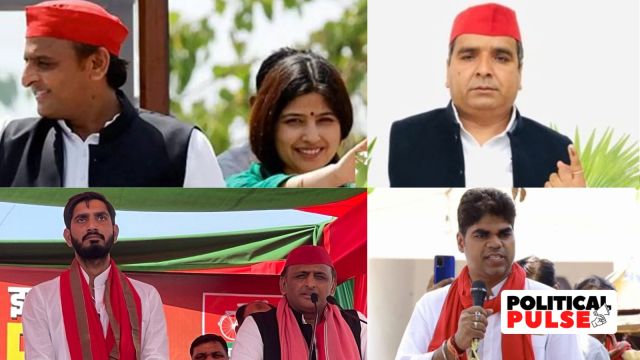Confident of retaining its core Muslim-Yadav voter base and seeking to make inroads into the votes of non-Yadav OBCs, who are seen to be consolidated in favour of the BJP, the Samajwadi Party (SP) has fielded only five candidates from the Yadav community in the 62 seats it is contesting in Uttar Pradesh in the Lok Sabha elections.

In 2019, when the SP contested 37 of the state’s 80 Lok Sabha seats in alliance with Mayawati’s BSP and Jayant Chaudhary’s Rashtriya Lok Dal (RLD), it fielded 10 Yadav candidates. In 2014, it contested 78 seats and nominated 12 Yadav candidates, including four from the “first family”, that is Mulayam’s clan.
Story continues below this ad
“The Muslims and Yadavs are firmly behind us. The party’s vote share increased when it joined hands with smaller parties, who draw the support of non-Yadav OBCs. The party has accommodated candidates from other communities to reach out to voters of other OBC groups and upper castes,” an SP leader said on the condition of anonymity.
Akhilesh has, in fact, coined a new slogan for the vote base he is banking on this time, expanding from “M-Y” or Muslim-Yadav to “PDA” or “Pichde, Dalit, Alpasankhyak”.
So, while five SP tickets have gone to Yadavs, it has fielded 27 candidates belonging to other OBCs, 11 upper castes (including four Brahmins, two Thakurs, two Vaishyas and one Khatri) and four Muslims. It has nominated 15 Dalit candidates in SC-reserved seats.
In contrast, the BJP, which is contesting 75 seats in UP (it has left five seats for three allies), has fielded 34 upper castes (16 Brahmins, 13 Thakurs, 2 Vaishyas and 3 belonging to other upper castes) and 25 OBCs, including one Yadav (Dinesh Lala Yadav in Azamgarh). The remaining 16 are on SC-reserved seats.
Story continues below this ad
This time, as part of its INDIA alliance, the SP has left 17 seats for the Congress and one for the Trinamool Congress (TMC). Of the Yadav candidates, SP chief Akhilesh Yadav is contesting from Kannauj; his wife Dimple Yadav, who lost in 2019 from Kannauj, is standing from Mainpuri; while Akhilesh’s cousins Dharmendra Yadav, Akshay Yadav and Aditya Yadav are the nominees from Azamgarh, Firozabad and Badaun, respectively.
While Aditya is the son of Mulayam’s brother and Jaswantnagar MLA Shivpal Yadav, Akshay is the son of the SP patriarch’s cousin Ram Gopal Yadav, who is a Rajya Sabha MP. Dharmendra is the son of Mulayam’s brother Abhay Ram Yadav, who has stayed away from politics.
SP spokesperson Rajendra Chaudhary claims the only consideration for their candidate selection was winnability. “The move had the approval of everyone in the party. In many seats, Yadav leaders proposed the names of those belonging to other castes. This time, leaders from various communities have been given the opportunity,” he says.
In 2019 too, five Mulayam family members were in the race. Of them, Mulayam and Akhilesh won in Mainpuri and Azamgarh, respectively, while all others lost – Akshay in Firozabad, Dimple in Kannauj and Dharmendra in Badaun. Other Yadav candidates fielded by the SP, in Etah, Jhansi, Pulpur, Faizabad and Varanasi, also lost, with the party picking up only 3 more seats besides those won by Mulayam and Akhilesh.
Story continues below this ad
In 2014 too, the SP won five seats – all by Mulayam family members. While Mulayam won from both Mainpuri and Azamgarh where he contested, Dharmendra, Dimple and Akshay won Badaun, Kannauj and Firozabad, respectively. But other Yadav candidates fielded by the party, in Farrukhabad, Jhansi, Faizabad, Sant Kabir Nagar, Deoria and Jaunpur, lost.
The BJP’s rise in the state, which began from the 2017 Assembly polls, has been attributed to the consolidation of non-Yadav OBC votes. Party spokesperson Avneesh Tyagi slammed the SP over ticket distribution and accused it of “restricting the representation of Yadavs to one family”.
“Their strategy (of trying to make inroads into non-Yadav OBCs) is not going to affect the BJP’s prospects as Prime Minister Narendra Modi and Uttar Pradesh Chief Minister Yogi Adityanath have a direct connection with the common man. The BJP’s welfare and development schemes are not discriminatory. The party is getting support from across communities,” he said.
































